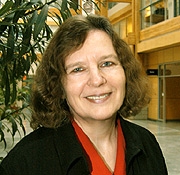Why Forestry Workers Should Run in Elections
Tuesday, June 17, 2008 03:45 AM
Part 2
By Peter Ewart and Dawn Hemingway



This article is the second in a series of three.
To access the previous one click on “Part 1.”
As the first article in this series pointed out, there are very few workers who sit in elected office today, to the point that there is a glaring imbalance in our political structures, given that workers and their families constitute the vast majority of the Canadian population.
There are a number of reasons put forward as to why this is the case. Besides the fact that most can’t come up with the financial resources or the “party backing” needed for a “winnable” nomination, there is a myth propagated that workers are not “capable” of carrying out such responsibility and just “don’t have the skills.” The same logic is used against other groups, including native peoples, women and others. But it is a faulty one.
When speaking of workers in particular, it is a very strange thing to say that they “don’t have the skills,” given that it is precisely these same workers who we depend so much upon for the smooth operation of our society. In fact, everything depends upon them. Every bit of food we eat, product we consume, building we are sheltered in, and road we drive on, has been manufactured, processed or constructed by workers. And the same holds true for all the services and utilities we, as a society, are supplied with.
Do we call upon a group of white-shirted accountants to put out a dangerous chemical fire at a factory? A lawyer in a pin-striped suit to reconnect power lines downed by a storm? A bank manager to fix the leaking gas main outside our house? An English professor to guide a train through a residential district? Hardly. If we value our safety, we don’t.
This is not to denigrate any of these professions – each has its role and place of importance in our society. But what is more important than preventing a chemical or environmental disaster? Than stopping a child from being electrocuted by a wayward power line? Than making sure our houses don’t blow up in a gas explosion? Than ensuring a train doesn’t derail into a river or a car fall apart on a highway? The fact is that every day, in a million ways, we trust these workers with our very lives. Why shouldn’t they also be well represented in the political affairs of our towns, provinces and country?
Many jobs today require workers to have a high degree of technical skill, as well as literacy in language, math, physics and computers. Other jobs require a wide range of abilities, including skills in organization and communication, as well as manual and mental dexterity and the ability to maintain alertness and concentration for long periods of time.
Indeed, a lot of political work requires similar skills. Take for example “organizing,” which is one of the most important requirements in the political realm. If anyone doubts that workers know how to organize, then he or she has never worked as a waiter in a busy restaurant at lunch time, or on an auto assembly line production team, or at a post office sorting facility, or with a maintenance crew in a factory or hazmat team in a mill. Most recently, of course, there was the organizing of the Mackenzie “Save Our Committee” rally, one of the largest in the history of northern BC, and one which was spearheaded by laid off millworkers.
So it simply makes no sense to suggest that workers are not “capable” or do not have the necessary “skills” to run for office. It is unbelievable, for example, to suggest that, of the 1,750,000 manufacturing workers in Canada, there is not one who is capable of sitting in the House of Commons, especially when, every day, we witness the disastrous behavior and shenanigans of some MPs and MLAs who are currently in office.
Some would argue that the problem lies with the political / economic system itself, whereby the wealthy and powerful rule, and working people are at the bottom, slaving away in the furnace room, keeping the “machinery” of society running. It was that way during the time of slavery in ancient Greece and Rome. It was that way during the feudal period when the kings, queens, princes and barons owned all the castles and all the land, while the peasants were out in the fields getting their hands dirty. As the old saying goes, “the more things change, the more they stay the same.”
But things do change. Workers can run for political office today. Yes, the odds are often against them, because they don’t have the big bucks and influence that establishment candidates have. In addition, some say, the political processes and political culture are not the most “worker friendly,” nor, for that matter, is the establishment media.
But since when have obstacles deterred working people? Not too long ago, unions were illegal or were suppressed. Yet workers found ways to organize them. Not too long ago, workers, along with women, native peoples and others, did not even have the right to vote. But again, through long struggles, they found a way.
And the same thing can be said about public education, medicare, unemployment insurance benefits, old age pensions, the eight hour day, and so on, which were all things that workers and their allies fought for and achieved.
Having workers better represented in parliament, legislatures and municipal councils is one of the important tasks of our time. The issue for workers is not whether to take up this task. Rather, it is how to do so.
Next article in the series: “Part 3 – Why forestry workers should run in elections.”
Peter Ewart is a writer and instructor, who lives in Prince George, BC. He can be contacted at peter.ewart@shaw.ca . Dawn Hemingway is a university professor, also based in Prince George, BC.
Previous Story - Next Story
Return to Home











I think what we should be getting from this article is that everyday people should be running for office as well as all the lawyers, professors,bank managers, because in our own way we are qualified for the job. We have lived it, learned from it. why not use it.